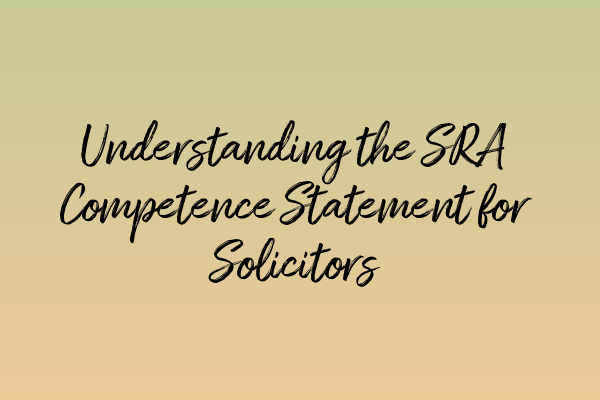Understanding the SRA Competence Statement for Solicitors
As a solicitor, it is vital to have a deep understanding of the Solicitors Regulation Authority (SRA) Competence Statement. This statement outlines the key skills, knowledge, and behaviors required of solicitors in order to provide competent legal services to their clients. In this article, we will delve into the details of the SRA Competence Statement and explore how it impacts the legal profession.
The SRA Competence Statement is divided into three distinct parts: Ethics, Professionalism, and Judgement, Technical Legal Practice, and Working with other people. These three parts encompass the core competencies that a solicitor must possess to effectively practice law.
Let’s start by looking at Ethics, Professionalism, and Judgement. This aspect of the Competence Statement focuses on the ethical obligations of solicitors, their commitment to professional standards, and their ability to exercise sound judgement. It emphasizes the importance of maintaining confidentiality, acting with integrity, and being competent in handling legal matters. A solicitor must also demonstrate respect for others, including clients, colleagues, and the court. Upholding these ethical and professional values is essential to maintaining the trust and confidence of clients and the public.
Moving on to the second part of the Competence Statement, Technical Legal Practice. This aspect revolves around the solicitor’s knowledge and application of the law. It includes understanding legal concepts, statutes, regulations, case law, and legal procedures relevant to their practice area. A solicitor must stay updated with changes in the law and continuously develop their legal knowledge and skills. This may involve undertaking further study, attending training courses, or engaging in professional development activities. The ability to analyze legal problems, conduct legal research, and provide accurate and timely legal advice is crucial for a solicitor’s competence in technical legal practice.
Finally, Working with other people is the third part of the SRA Competence Statement. This encompasses the solicitor’s ability to communicate effectively, collaborate with others, and build professional relationships. Solicitors must be skilled in client care, managing relationships with clients, and understanding their needs. They should also demonstrate the ability to work well with colleagues, experts, and other professionals involved in legal matters. Effective teamwork, negotiation, and mediation skills are vital to successfully representing clients and achieving positive outcomes.
In conclusion, the SRA Competence Statement sets out the core competencies that solicitors must possess in order to practice law competently. From ethical obligations and professionalism to technical legal practice and working with other people, solicitors need to meet the requirements outlined in the Competence Statement. By doing so, they can provide high-quality legal services to their clients and maintain the highest professional standards.
To excel in criminal law and further enhance your legal skills, check out our related articles:
– SQE Prep: Tips and Tricks to Excel in Criminal Law
– Cross-Examination Techniques: Mastering the Art of Questioning
– Private Prosecutions: Exploring Non-Governmental Prosecutions in Criminal Cases
– Ethical Challenges in Criminal Defence: Navigating Dilemmas
– Assault and Battery Laws: Understanding the Legal Parameters
These articles will provide you with valuable insights and tips to enhance your legal knowledge and skills in various aspects of criminal law.


Leave a Reply